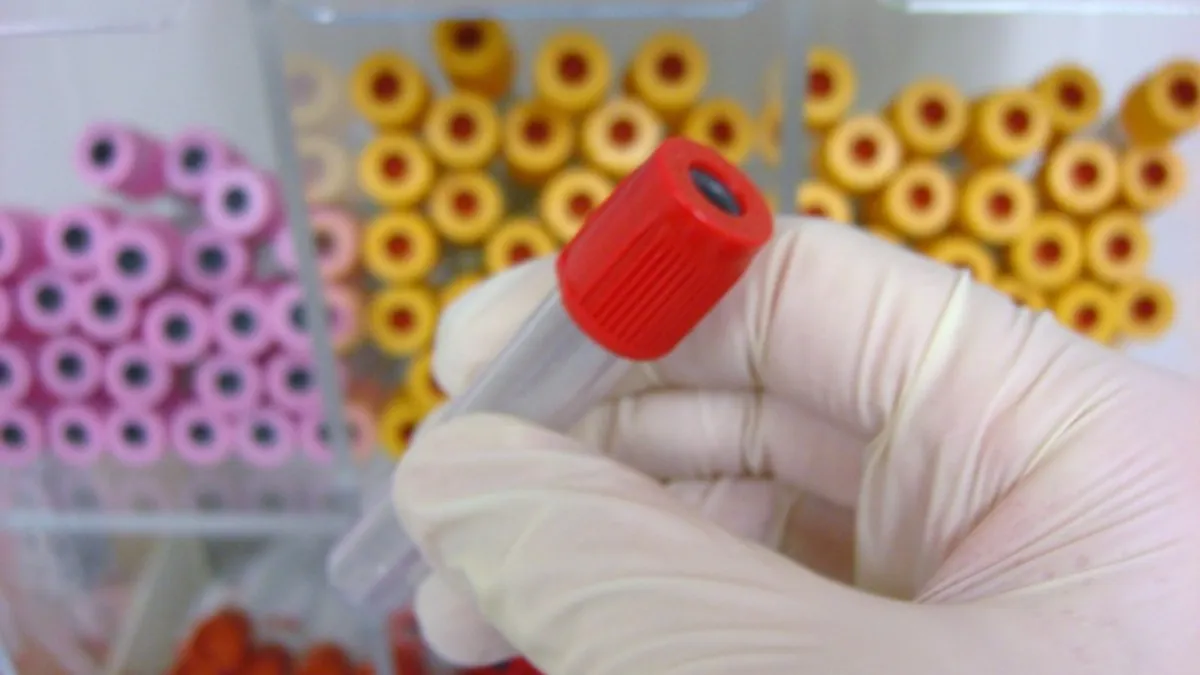Dive Brief:
- Under a proposed CMS coverage policy for blood-based screening tests for colorectal cancer, the first such FDA-approved assay sold by Epigenomics failed to meet criteria for Medicare beneficiaries. Still, Wall Street analysts say the draft memo bodes well for other liquid biopsy developers targeting the same market.
- According to the draft, CMS would cover a blood test to screen for CRC once every three years, or at an appropriate interval designated in FDA labeling, when ordered by a treating physician, performed by a CLIA-certified lab and when certain product and patient qualities are met. CMS said Epigenomics failed that test.
- The proposal, open for comments through mid-November, has implications for a number of companies targeting the colorectal cancer screening market, including Exact Sciences, Guardant Health and Freenome.
Dive Insight:
Earlier colorectal cancer detection has become a prime target for diagnostics companies. At nearly 150,000 new U.S. cases each year, colorectal cancer cases trail only cancers of the lung, breast and prostate, according to American Cancer Society statistics.
While colonoscopy has historically been the gold standard for screening, medtechs have looked for less invasive methods to catch signs early. One method is stool-based testing. Exact Sciences' product Cologuard received FDA approval in 2014 and subsequently gained CMS backing.
Epigenomics AG, the German company with operations in San Diego, was the first entity to receive FDA approval for such a blood test — its Epi proColon product — in 2016. It instigated the CMS national coverage analysis this year for blood tests.
But in a draft policy issued Friday, CMS said the proColon test did not meet its criteria for coverage.
To receive coverage, CMS said a test must be authorized by FDA for colorectal cancer screening; have sensitivity of at least 74% and specificity of at least 90% compared to the current standard screening technique (colonoscopy) as proven in pivotal studies outlined in FDA labeling; and be recommended as a routine screening test by at least one professional society guideline consensus statement, or U.S. Preventive Services Task Force recommendation.
Eligible patients are between the ages of 50 and 85; asymptomatic; and at average risk for developing the cancer.
Epigenomics CEO Greg Hamilton lambasted the CMS decision during an investor call Tuesday morning, describing it as a "shock" and "incomprehensible." Although the company plans to challenge the decision, the development comes at a particularly vulnerable time for Epigenomics, and Hamilton underscored the company's need to raise capital. Epigenomics ended the third quarter with 6.6 million euros in cash, which only gives it liquidity through the first quarter of 2021.
The future implications of a coverage policy are relevant to myriad companies that have since taken steps toward the market. An initial comment period in March this year drew feedback from LabCorp, Quest Diagnostics, Guardant Health, Freenome, colorectal cancer groups and leading medical centers.
SVB Leerink analysts characterized CMS' proposed barriers to coverage as "low and within reach." They also see regulators' ruling on the tests as "directionally positive" for multi-cancer screening tests, including those being developed by Grail, Thrive Earlier Detection and Exact Sciences.
Likewise, analysts at UBS described the criteria as "somewhat more favorable than we would have expected," but concluded that liquid biopsies "need to come close to Cologuard to be successful."
The new CMS public comment period opened Friday and extends through Nov. 15.











